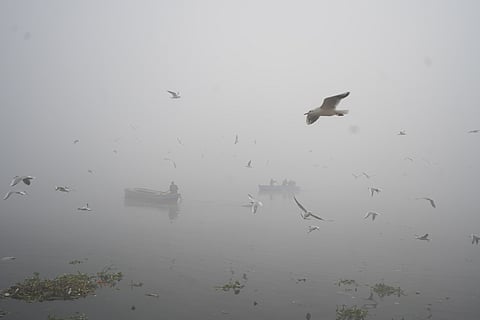

The Delhi government is stepping up pollution control efforts as the capital’s air quality hit alarming levels, recording a severe Air Quality Index (AQI) of 428 at 9 am on Thursday. Environment Minister Gopal Rai announced that the city would strictly enforce measures under Stage 2 of the Graded Response Action Plan (GRAP) to address deteriorating air quality. Despite the severe pollution, Rai indicated that GRAP Stage 3 would not be imposed yet, as the situation is expected to improve by Friday.
Rai attributed the worsening air quality to a mix of calm winds and colder temperatures, which prevent pollutants from dispersing. Citing studies, he noted that pollution in Delhi stems from both local and regional sources: around 30% from within the city and 34% from the National Capital Region (NCR). Rai assured that the government would review and intensify current campaigns and measures under GRAP 2, aiming to prevent further decline and avoid reaching emergency levels. “We will strengthen all ongoing campaigns and actions to mitigate pollution,” he stated.
Rising health concerns among residents
The high AQI has sparked widespread concern among Delhi residents, who report health issues ranging from respiratory problems to eye irritation. Bhayender, a local, said the pollution is affecting daily routines, with many struggling to breathe and experiencing burning eyes. “Earlier, we used to go for runs, but now we can’t even do that,” he told news agency ANI.
School student Raunak shared his struggles with persistent coughing, worrying about potential long-term impacts on his lungs. He suggested that the situation could improve with greater use of CNG-based vehicles but pointed to a lack of public cooperation in pollution control efforts. Prateek, another resident, noted reduced visibility on the roads, saying, “The visibility on the roads has reduced... our eyes burn, and we have started feeling suffocated. The government needs to do something.”
AQI readings across Delhi’s key locations have escalated, with Anand Vihar at 470, Ashok Vihar at 469, ITO at 417, and Rohini at 451. These figures mark some of the highest levels recorded in the country, with the AQI falling into the ‘severe’ category for the first time this season.
Delhi government holds off on GRAP-III, continues with GRAP-II as pollution persists
Amid rising pollution levels in Delhi, Environment Minister Gopal Rai announced that the government will not yet impose the third phase of the Graded Response Action Plan (GRAP-III). This decision followed a meeting by the Commission for Air Quality Management (CAQM), which assessed the pollution situation.
Rai explained that the decision was based on weather predictions, which suggest an improvement in air quality over the coming days. Despite this, the government will continue enforcing the provisions under GRAP-II, which includes stricter pollution control measures. Rai emphasized that all relevant departments would strictly follow GRAP-II rules to prevent the situation from escalating into the "severe" category, and warned that the government would take more stringent actions if pollution worsens.
Government’s industry exemptions amid pollution control efforts
Even as Delhi tightens pollution controls, the Central government has granted exemptions to certain low-pollution industries from select regulations under Section 21 of the Air (Prevention and Control of Pollution) Act, 1981. This exemption applies to industries with a pollution index score of up to 20, as outlined in a recent notification by the Central Pollution Control Board (CPCB). The exempted categories include air cooler assembly, bicycle assembly and repair, bio-fertilizer production, and medical product manufacturing, among others.
According to the notification, eligible industries must inform their respective State Pollution Control Boards or Pollution Control Committees in writing. The exemption also applies to plants with prior environmental clearance under the Environment (Protection) Act, 1986, as per the notification dated September 14, 2006.
(With inputs from PTI, ANI)